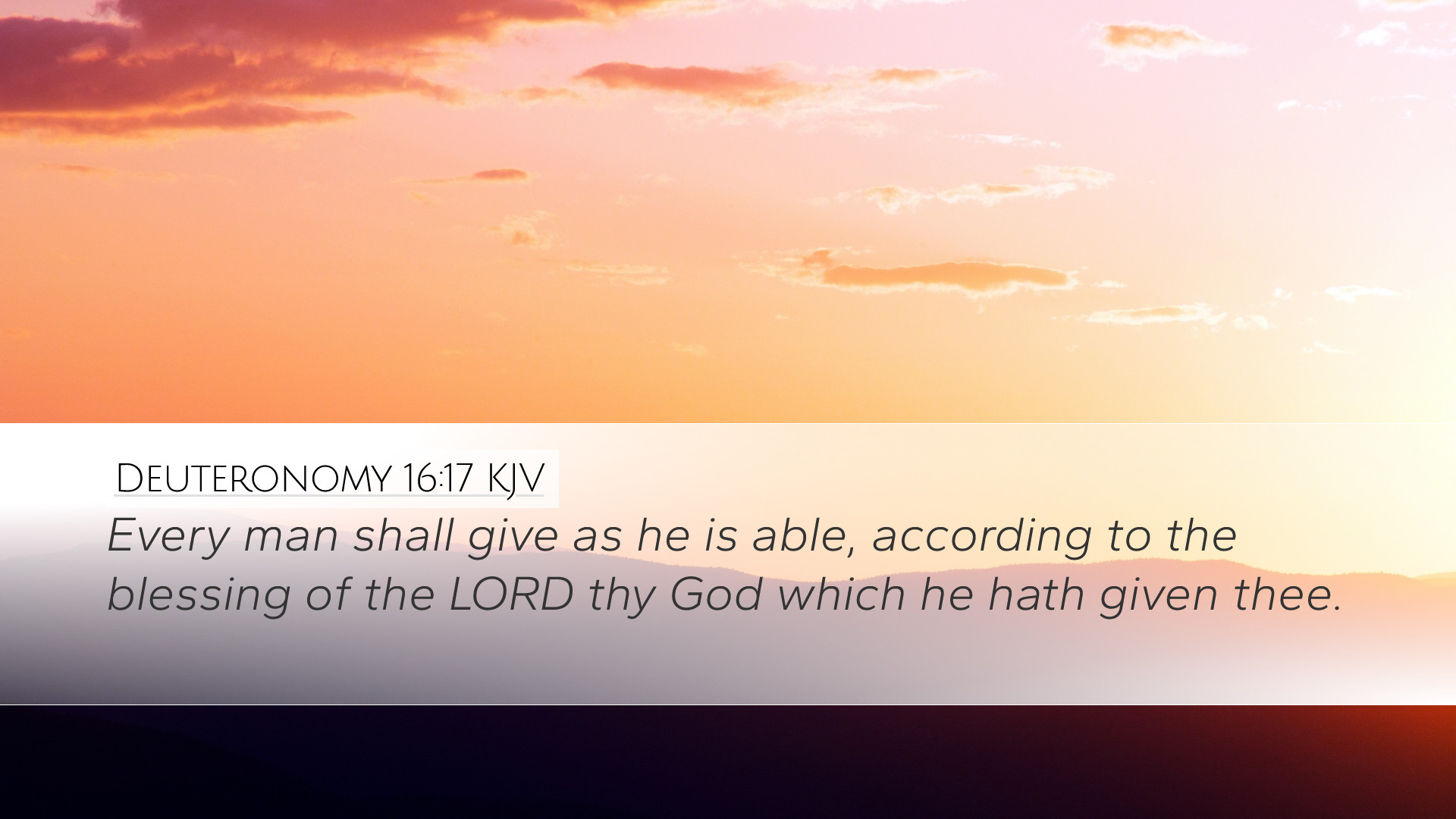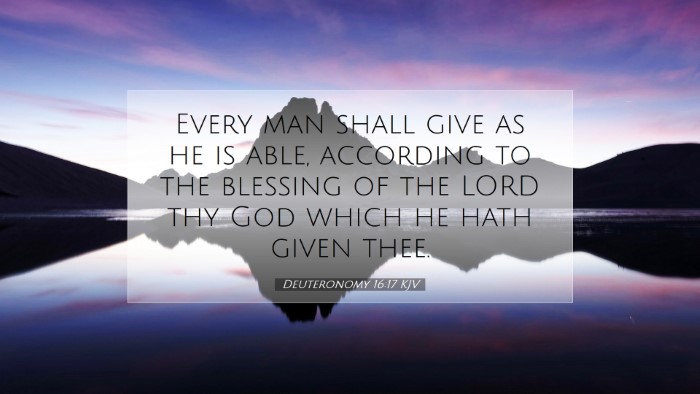Commentary on Deuteronomy 16:17
Deuteronomy 16:17 states, "Every man shall give as he is able, according to the blessing of the Lord your God that he has given you." This verse emphasizes the principles of generosity and accountability in the context of communal worship and sacrificial giving. It calls the faithful to recognize the blessings received from God and to respond appropriately in their giving to sustain the priesthood and the worship of the community.
General Overview
This verse is an essential part of the broader context of the law concerning the feasts and acts of worship intended to establish regular moments of rejoicing and remembrance for Israel. The guidelines provided in this chapter serve to reinforce the significance of worship in the life of the nation and the individual's responsibility to contribute to communal religious practices.
Insights from Commentaries
Matthew Henry's Commentary
According to Matthew Henry, this verse reflects the divine economy in which God has an expectation not just for tithes but for reasonable offerings from a heart oriented towards gratitude. Henry emphasizes that the scale of giving should correlate directly with the blessings received, suggesting a deep understanding of stewardship and personal responsibility.
Henry expands on the idea that giving is not merely a duty; it is an act of worship which arises from a thankful heart. He stresses that the amounts given should not be the same for every person because blessings from God vary among individuals. This principle cultivates a sense of graciousness among the faithful, encouraging them not only to give but to consider the amount in light of God’s providence in their lives.
Albert Barnes' Commentary
Albert Barnes asserts that this verse encapsulates a broader theological framework regarding worship and sacrifice. He reminds readers that God does not desire obligatory giving detached from the spirit of generosity; instead, He seeks willing offerings that reflect an understanding of the divine gifts bestowed upon each person. Barnes details how this instruction promotes equality in giving—while the amounts may differ, every individual's contribution is valued as it correlates to God's provision.
He expresses that this principle fosters a healthy relationship between individuals and God, urging believers to measure their giving against God's blessings, which in turn reflects their spiritual maturity and acknowledgment of their dependency on divine grace.
Adam Clarke's Commentary
Adam Clarke provides further depth by drawing attention to the communal aspect of giving highlighted in this verse. He posits that the phrase "according to the blessing of the Lord your God" implies a recognition of the corporate nature of worship and service. Clarke indicates that this perspective invites individuals to view their personal contributions as integral to the well-being of the community of believers, entwined with the collective faith journey.
Clarke also provides practical implications of this verse, suggesting that it would be beneficial for leaders to encourage a culture of generous giving while ensuring that such contributions are allocated effectively for communal worship and ministry. He suggests that this method not only sustains the physical needs of the religious community but also enriches the spiritual lives of its members as they partake in the act of giving.
Theological Implications
The theological implications of Deuteronomy 16:17 extend into various areas, including soteriology (the study of salvation), ecclesiology (the study of the church), and ethics in giving. The acknowledgment of God’s blessings as the basis for generous giving speaks to a fundamental principle of Christian stewardship. This verse challenges believers to assess their lives in light of what they have received from God, aligning their priorities and actions with the divine economy.
Practical Applications
- Developing a Generosity Mindset: Believers should cultivate a mindset that views all possessions as gifts from God, resulting in a cheerful and willing heart to contribute to acts of worship.
- Encouraging Accountability: Individual giving should not only be about what one can afford, but it should be considered in the light of personal blessing and the community's needs.
- Engaging in Shared Worship: Recognizing that giving contributes to a collective experience of worship can help strengthen the bonds within a church community.
- Reflecting on God's Blessings: Regular contemplation of God’s blessings can instill gratitude that translates into action, prompting believers to give generously.
Conclusion
Deuteronomy 16:17 powerfully reminds the faithful of their responsibility to respond to God’s blessings through generous giving. The insights derived from the commentaries of Matthew Henry, Albert Barnes, and Adam Clarke provide valuable perspectives that can enrich the understanding of this text. Through a commitment to giving proportionate to the blessings received, individuals contribute not only to their own spiritual growth but also to the health and vitality of their communities of faith.


